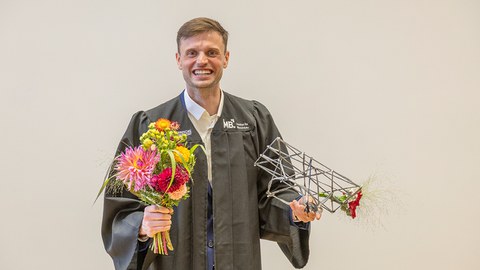Aug 19, 2025
Promotion Kai Zernsdorf

Successful dissertation defense by Kai Zernsdorf
On 18.08.2025, Mr. Kai Zernsdorf, M.Sc., successfully defended his scientific thesis as part of the doctoral procedure 👨🎓 with the topic "Numerical simulation of the load-bearing behavior of mineral-impregnated carbon fiber reinforcement". In addition to the chairman of the doctoral committee, Prof. Dr. Ivo Herle (TU Dresden), Prof. Dr.-Ing. Dr.-Ing. E.h. em. Manfred Curbach (TU Dresden), Prof. Dr. Thomas Bösche (University of Applied Sciences Dresden (HTW)) and Prof. Dr. Klaus Holschemacher (HTWK Leipzig) were present as reviewers. Prof. Dr. Holger Flederer (University of Applied Sciences Dresden (HTW)) was also present as a member of the doctoral committee.
Abstract:
Mineral-impregnated carbon-fiber (MCF) reinforcement represents a novel composite material comprising unidirectionally aligned carbon filaments bonded by a mineral-based impregnation matrix. The reinforcement is embedded in high-performance fine-grained concrete to form structurally efficient and thermally robust reinforced concrete structures.
To fully exploit the potential of MCF reinforcement, it is essential to characterize its elastic and inelastic behavior and to model the complex interactions between the reinforcement and the surrounding concrete matrix with high fidelity. This study presents a multiscale approach based on the finite element method (FEM) to simulate the load-bearing behavior, deformation, and crack propagation of MCF-reinforced concrete structures.
At the microscale, a discrete modeling approach using representative volume elements (RVEs) was developed to reflect the stochastic filament distribution, anisotropic damage evolution in the mineral matrix, and the nonlinear interaction between filaments and matrix. The RVE was calibrated and validated against experimental stress-strain data reported by WILHELM [127].
At the mesoscale, an analytical bond stress-slip relationship was integrated into the commercial FEM software ANSYS utilizing nonlinear spring elements. The model was validated through pullout tests.
At the structural scale, tensile and bending simulations of MCF-reinforced concrete elements were performed using the calibrated material models. The simulation results demonstrate the capacity of the model to predict stiffness degradation, crack initiation and propagation as well as load-bearing capacity.
The findings provide key insights into the mechanical performance of MCF-reinforced concrete and establish a validated computational framework that facilitates the future design and optimization of this innovative reinforcement material in structural concrete applications.
Dear Kai, we wish you every success in your future scientific career and, of course, all the best for your future! 👍🥳
